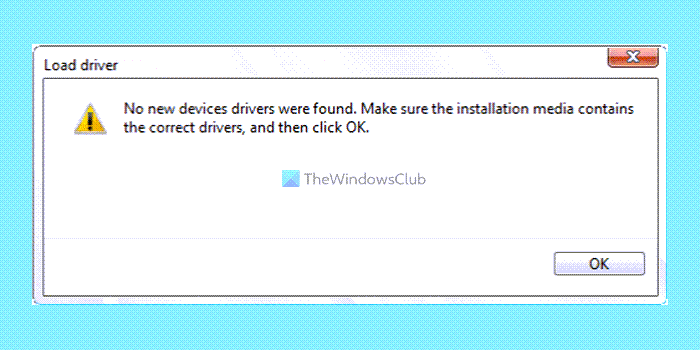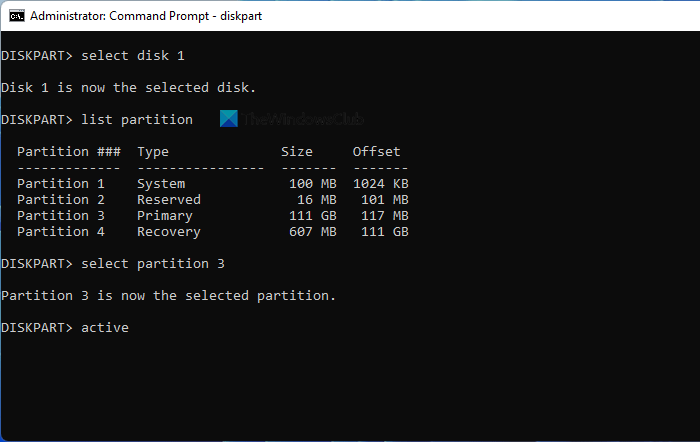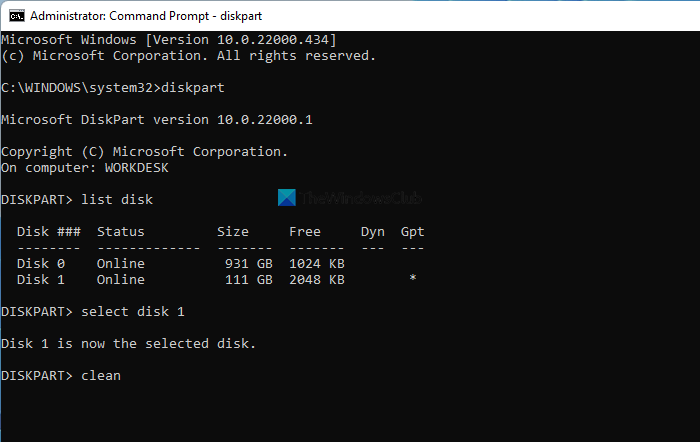While installing Windows 11 or Windows 10, if you get No device drivers were found error, here is how you can fix the issue. It happens when you try to clean install Windows 11/10 on your computer. Although it doesn’t appear frequently, you can troubleshoot the problem if you are getting it.
No new devices drivers were found. Make sure that the installation media contact the correct drivers, and then click OK.

The error means Windows didn’t find the correct drivers to go ahead with the installation, which can happen for many reasons. For instance, your installation driver might be corrupted or not signed, you are trying to install unsupported drivers, or Windows is having trouble verifying the drivers. The error occurs during Windows installation when the user tries to install drivers along with Windows setup.
If this problem occurs, you cannot fix it by clicking the corresponding OK button. If your selected hard drive becomes inactive, there is a chance of getting this error. On the other hand, a corrupted ISO file can also cause this issue. Therefore, follow this article to get rid of the issue you are getting while installing Windows 11 or Windows 10.
No device drivers were found error during Windows Setup
The Windows installation window allows you to select the correct device drivers. Alternatively you can try using a fresh copy of the driver to complete your Windows Installation. To fix the No device drivers were found error, during Windows installation, you can use one of these suggestions:
- Make Partition active
- Format Hard drive
- Browse to Add Device Driver
- Create fresh bootable USB
To learn more about these steps, continue reading.
1] Make Partition active

It is the first thing you need to follow in order to fix the aforementioned issue. For that, you must continue using the bootable USB you have made earlier to clean install Windows OS. Then, follow these steps:
- Make sure you are in the boot manage and the installation wizard is opened.
- Choose the language and click the Next button.
- Click on the Repair your computer option.
- Go to the Advanced options and select Command Prompt.
- Enter the password and click the Continue button.
- Enter these commands:
diskpart list disk select disk [disk number] list partition select partition [drive-letter] active
After that, restart the installation process.
Hopefully, you won’t have any problem. However, if it doesn’t help, you can follow the next solution.
2] Format Hard drive

If there is some problem with the hard drive, you might have the same problem while installing Windows 11 or Windows 10. Whether it is an SSD or HDD, the problem will remain the same. To fix that issue, you need to format your hard drive. For that, do the following:
- Open the install wizard > choose the language > click the Next button.
- Click on the Repair your computer option.
- Navigate to Advanced options > Command Prompt.
- Enter the password and click the Continue button.
- Enter these commands:
diskpart list disk select disk [disk-number] clean create partition primary format fs=ntfs quick
Then, you need to close all windows and restart the installation process.
3] Browse to Add Device Driver
The error means that your drivers are not readable, signed, or corrupt. Hence, manually downloading the driver files and adding them to your bootable USB drive would be a good idea. So you can manually select the driver files while installing Windows at a later stage.
Here is a step-by-step guide:
- First, you must download the chipset or storage drivers from your computer manufacturer’s website. For laptops and pre-built PCs, the manufacturer would be the company. For a custom PC, the manufacturer would be the motherboard company.
- To download the drivers go to the OEM’s website and search for the drivers using the model number.
- Once drivers are downloaded, extract them inside your bootable USB Driver.
- After that, boot up your PC using the USB Driver, usually as you do.
- Once you reach the screen where you received the error, choose the browse button.
- Now, select the inf files and click Ok.
- Finally, Windows will verify the driver files and let you complete the installation.
Once the setup is complete, you can go to the device manager and verify if the driver was installed on the PC. Though we still believe installing a driver post-installation is a better choice. However, if you are testing a setup disk, then it’s worth doing it.
4] Create fresh bootable USB
If none of the above-mentioned solutions worked for you, you might need to create a fresh bootable USB drive of Windows 11 or Windows 10. You have multiple options in your hands. For example, you can create a bootable Windows 11 installation media by downloading the Windows 11 ISO, using Media Creation Tool, etc. Either way, you need to create a clean installation media and perform a fresh installation.
Related: A media driver your computer needs is missing.
How do you fix No drivers are installed for this device?
If you get No drivers are installed for this device error in the Device Manager, you need to install the corresponding driver. For example, if you are getting this error for the graphics card, you need to install the graphics driver. Similarly, you need to perform the same thing for audio driver, Wi-Fi driver, or any other.
What is a Signed Device Driver?
A signed device driver is a driver that has been digitally signed by the manufacturer or developer to indicate that the driver works with the Windows version. This is important because it ensures that the driver is not corrupted or altered. If not, then it can cause problems with the PC. To use a signed device driver in Windows, the driver must be signed with a digital certificate recognized by Microsoft. This certificate is used to verify the driver developer’s identity and ensure that the driver has not been tampered with. That said, if you try to install a driver from a non-verified website, Windows will warn you about its legitimacy. It is advised never to install a driver from unknown sources.
How do you tell if a Driver is Signed?
If you have downloaded a driver, and want to check if the driver is signed, then you can use the sigverif tool in Windows. When you launch the Sigverif tool, go to the advanced option and then use the browser button to select the driver package you need to verify. Sigverif will scan the driver package and verify the signatures of all the drivers included in the package. If any of the drivers are not signed, Sigverif will display a message indicating that the driver is not signed and may not work correctly with your system.
How do I fix No device drivers found during Windows 11/10 installation?
To fix No device drivers found during Windows 11/10 installation error, you need to follow the above-mentioned solutions. First, you have to make the partition active so that it can be used for installing Windows 11/10. Secondly, you can format the hard drive. Last but not least is that you can create a fresh Windows 11/10 installation media.
That’s all! Hope this guide helped.